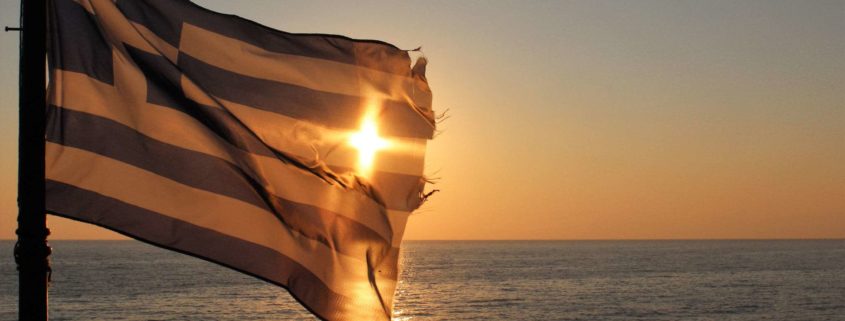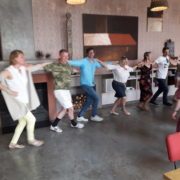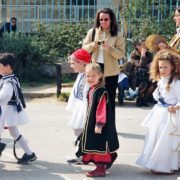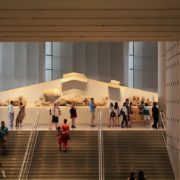The Greek National Holiday of October 28th – or the OXI Day, is a public holiday or a “national anniversary” because this day reminds everybody of important historical event.
Greece has two national holidays which are linked to major historical events and celebrated all over the country:
March 25th and October 28th.
The October 28th celebration is also called the “Ochi day” (ochi meaning ‘no’), reminding that in 1940 prime minister Ioannis Metaxas refused the Italian forces to enter Greece.
As a result, Greece entered World War II and the Greek-Italian war of 1940-1941 began.
So let’s learn more about history and how Greeks celebrate this national anniversary.
What happened in Greece on October 28, 1940?
At dawn of October 28, 1940, the Italian ambassador, Emanuele Grazzi, presented the Greek Prime Minister Ioannis Metaxas the ultimatum of Italian Dictator Benito Mussolini. This required the Italian army to cross the border with Albania and to occupy Greece. Metaxas replied in French « Alors, c’est la guerre » [‘So this is war’]. In a few hours the Italian army entered northeastern Greece. Greek soldiers successfully fought the Italian-Albanian forces and pushed them back into Albania. Because of that, Hitler’s German army had to step in and it invaded Greece in April 1941. The occupation lasted until October 1944.
How do Greeks celebrate their national anniversary?
Some weeks prior to October 28th Greeks start decorating streets and balconies with Greek flags. Greek TV broadcasts movies about the war of 1940. On the state radio you will hear heroic songs of the time (you can find one of the most popular songs below).
In schools, pupils recite poems, sing songs or play scenes from the Greek-Italian war wearing costumes of the time. The school teachers usually talk about Greeks’ heroism at the war.
Some weeks prior to October 28th, gymnasium students start practicing their parade. See an example of schoolchildren on the island of Syros, enjoying their practice!
On the anniversary day, schoolchildren parade on the main street of their village or neighborhood, that is they march synchronously along with military music.
Pupils’ parents and many people watch the parade, wave small flags and applaud.
The best student of each school holds the Greek flag in the parade and is called simeofóros ‘the flag-bearer’.
Before the parade, they lay a wreath of laurel onto the monument or square of the municipality or village they live in.
After the parade, families and friends get together and many times eat out in a tavern.
Of course, Greek dancing can be seen all over Greece as well.
Take a look at another video, from Naxos island
Χρόνια πολλά!
++++++++++++++++++++++++
Below you can find an example of a heroic song of the time
Title: Children Children of Hellas
Click here to Listen to the song on YouTube, and read the lyrics as well as the translation.
Τραγούδι: «Παιδιά της Ελλάδος παιδιά»
| Στίχοι: Μίμης Τραϊφόρος | Lyrics: Mimis Traiforos |
| Μουσική: Μιχάλης Σουγιούλ | Music: Mihalis Souyioul |
| Πρώτη εκτέλεση: Σοφία Βέμπο | First version: Sofia Vebo |
| Μέσ’ στους δρόμους τριγυρνάνε | Mothers are wandering in the streets |
| οι μανάδες και κοιτάνε | Seeking |
| ν’ αντικρίσουνε, | To face |
| τα παιδιά τους π’ ορκιστήκαν | Their children who took an oath |
| στο σταθμό όταν χωριστήκαν | When they parted at the station |
| να νικήσουνε. | To win at war |
| Μα για `κείνους που `χουν φύγει | But let’s be glad |
| και η δόξα τους τυλίγει, | For those who have left us |
| ας χαιρόμαστε, | And have been wrapped in glory |
| και ποτέ καμιά ας μη κλάψει, | And may none of us ever cry |
| κάθε πόνο της ας κάψει, | May bury her sorrow |
| κι ας ευχόμαστε: | And let’s all wish: |
| Παιδιά, της Ελλάδος παιδιά, | Children, children of Hellas |
| που σκληρά πολεμάτε πάνω στα βουνά, | Who are fighting a tough war on the mountains |
| παιδιά στη γλυκιά Παναγιά | Children, towards Virgin Mary |
| προσευχόμαστε όλες να `ρθετε ξανά. | We do pray for you to come back again |
| Λέω σ’ όσες αγαπούνε | I say to those who love |
| και για κάποιον ξενυχτούνε | And stay all night awake |
| και στενάζουνε, | And sigh |
| πως η πίκρα κι η τρεμούλα | that bitterness and trembling |
| σε μια τίμια Ελληνοπούλα, | Do not fit |
| δεν ταιριάζουνε. | A proper Hellene woman. |
| Ελληνίδες του Ζαλόγγου[1] | Hellene women of Zalongo, |
| και της πόλης και του λόγγου | Of the cities and the forests |
| και Πλακιώτισσες[2], | And women of Plaka, |
| όσο κι αν πικρά πονούμε | However bitterly we suffer |
| υπερήφανα ας πούμε | Let’s cry out proudly |
| σαν Σουλιώτισσες. | Like women of Souli would do: |
| Με της νίκης τα κλαδιά, | Children, we are expecting you |
| σας προσμένουμε παιδιά | Carrying palm branches of victory. |
[1] Zalongo, a village in Epirus, is known for the Dance of Zalongo: in 1803 women from Souli and their children committed mass suicide by throwing themselves off a steep cliff in order to avoid enslavement by the Ottomans.
[2] Plaka is an old historical neighborhood of Athens, on the slopes of Acropolis.
+++++++++++++++++++++++








